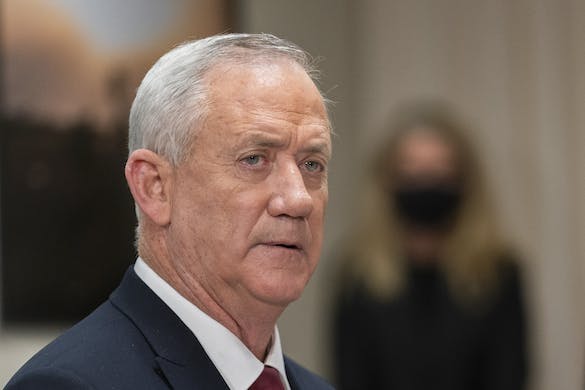Israeli, Saudi Brass in Washington for Parallel Meetings, Raising Hopes for a ‘Plan B’ Against Iran
Both countries oppose Tehran’s regional aggression and are skeptical about President Biden’s eagerness to renew a 2015 nuclear deal.

Israel’s defense minister, Benny Gantz, and a Saudi prince, Khalid bin Salman, are visiting Washington at the same time this week. Will they succeed in nudging the Biden administration away from Iran appeasement — and toward a Plan B? And what might the B stand for?
The itineraries of Mr. Gantz and Prince bin Salman are raising speculation in both countries that their trips are coordinated and aimed at refocusing America’s Iran policy. Both countries oppose Tehran’s regional aggression and are skeptical about President Biden’s eagerness to renew a 2015 nuclear deal.
In the course of two days, the Israeli defense minister and Saudi vice minister of defense met, separately, with the same American officials — National Security Adviser Jacob Sullivan and Secretary of Defense Austin. Both guests highlighted Iran as a focus of the discussions.
Officially, the Biden administration remains convinced diplomacy can best stop the Islamic Republic’s nuclear advances. Yet, Tehran increasingly signals unwillingness to finalize a deal. So the Israelis and Saudis could yet see an opening to change minds in Washington.
The Jerusalem Post’s editor in chief, Yaakov Katz, noted that the Israeli and Saudi officials met with the same White House and Pentagon officials. “Coincidence or US-Israel-Saudi coordination taking place just below the surface?” Mr. Katz asked on Twitter today.
Further fueling rumors that Israel and Saudi Arabia are coordinating their Washington policies, Mr. Gantz said in a statement after his White House meeting: “Action should be taken against the Iranian aggression in a number of ways, including strengthening the US-led coalition in the region.”
Additionally, the new commander of Centcom, America’s forces in the Mideast, General Michael Kurilla, visited Israel this week at the same time that the Israeli Defense Force is conducting a month-long exercise dubbed Chariots of Fire.
In what is widely perceived as a signal to Tehran, an American Air Force plane is scheduled, as part of the drill, to refuel Israeli fighter jets — a simulation of an Israeli strike against Iran’s nuclear facilities.
If talks about renewing the nuclear talks end, America may well renew its support of Israeli sabotage operations against Iranian nuclear facilities as well. Such expirations have been on hiatus in recent months.
In his meeting with Mr. Sullivan, Mr. Gantz “discussed Iran’s progression in its nuclear program alongside its destabilizing regional activities and emphasized the need to work closely and prepare for any future scenario,” the Israeli minister said in a statement.
At the same time, Prince bin Salman’s visit may signal that America’s icy relations with Riyadh are warming up. Early in his presidency Mr. Biden said Saudi Arabia was a “pariah” state. Citing the war in Yemen and the killing of Jamal Khashoggi, Mr. Biden made Riyadh a totem of his vow to refocus America’s foreign policy and center it on human rights.
Now, however, rising energy prices are forcing Washington to beg Riyadh to raise oil production. Initially Crown Prince Mohamad bin Salman refused to even take a call from Mr. Biden. He also signaled intentions to forge relations with America’s adversary, Communist China.
Yet, the Saudis are eager to renew their century-old bond with America. According to some reports Prince bin Salman’s visit to Washington could pave the way for a meeting between his brother, the crown prince, and Mr. Biden.
CNN is reporting that a White House visit by the Saudi crown prince, known as MbS, is already in the works. “You should count on something like this happening, it just comes down to when, not if,” the network quoted a former American official as saying.
Warming relations between Saudi Arabia and America might add Riyadh to the group of Arab countries that made peace with Israel in the Abraham Accords. Even if relations remain unofficial, Saudi Arabia and Israel will continue to cooperate in various fields, including intelligence-sharing.
Both countries see the need to coordinate a pushback against Iran’s regional aggression and both are highly skeptical over Mr. Biden’s Iran diplomacy. As the Washington trips may indicate, both are now hoping to reshape Washington’s thinking about the day after the Vienna track, now on hiatus, collapses.
“With two of America’s key regional partners visiting Washington, now is the time to devise what a plan-B policy looks like in practice,” an Iran watcher at the Foundation for Defense of Democracies, Behnam Ben Taleblu, says.
Yet, Mr. Taleblu is unconvinced that Mr. Biden is ready for such a commitment. “Support for and participation in military drills is one thing,” he says. “But this signal is likely to be drowned out by America’s continued quest for a fatally flawed nuclear deal.”

